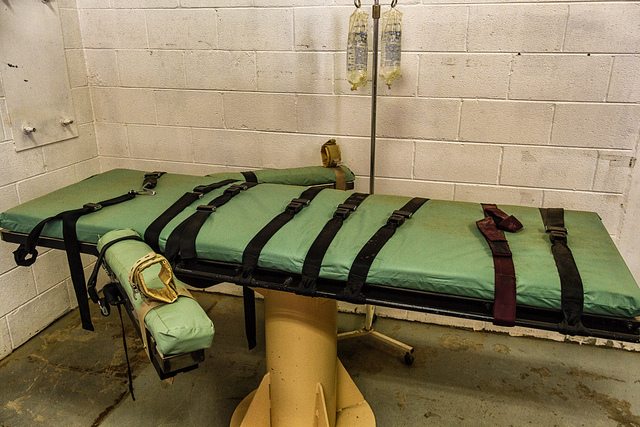Life and Death Row
The topic of the death penalty has been in the internet spotlight recently due to the fame of Ray Jasper, a death row inmate, who wrote an insightful letter about prison life to Gawker. Gawker published this letter online and it became viral within days, with many readers praising Jasper’s insight and critique of a prison system which he believes is “truly broken beyond repair”.
With the release of “Life and Death Row”, the BBC has contributed immensely to the age old argument on the morality of the death penalty. The quality which makes the programme so powerful is its ability to look in detail and directly at all angles of the death penalty. This multi-faceted approach is done through face to face interviews with the victims, the perpetrators, the families of both and the state police.
The documentary is about two death row inmates, Richard Cobb and Anthony Haynes, who had been sentenced to the death penalty after committing crimes in their teens.
The programme opens with Nikki Daniels – who was shot by Cobb and raped by his accomplice – discussing Cobb’s impending execution with her young child. The scene is an unusual one, as the vitality and life shown in the young child is in juxtaposition to the subject of conversation: death. Although the main aim of the documentary is to provide a powerful look at the American justice system, the documentary illustrates the innocence of childhood on numerous occasions. For example, when Nikki’s child fails to provide an answer as to why Cobb should be executed and naively says she “doesn’t know” the viewer is reminded how strong an affect parents have on their children’s lives and views. Furthermore, in another scene the programme focuses on Nikki’s child giggling trying to say the word “execution” and this makes for odd viewing due to the child’s understandable failing to comprehend the gravity of the situation.
After this introduction, we are given an in depth audio description of the crimes Cobb has committed and this description is interwoven with upsetting and disturbing images of the actual crime scene, including pictures of the gun wounds of Nikki and her co workers sustained. It is then that we are acquainted with the man responsible for Nikki’s trauma and the murder of her co-worker: Cobb.
The quality which makes the programme so powerful is its ability to look in detail and directly at all angles of the death penalty.
Cobb provides one of the most poignant moments in the documentary. After finding out about his death sentence he stares into the camera with his sleep devoid clear blue eyes and utters prophetically that killing him “is not going to give anyone the peace they are looking for, it’s only going to continue the cycle. The cycle of violence”. This quote in a way epitomises the whole documentary: the programme is about the victims’ families looking for peace, but not attaining it. After the execution of Cobb, Nikki Daniels understandably appears shaken, and one gets the feeling that she will never get closure from the event, as what she witnessed and what happened to her was so shockingly brutal.
It is these one on one interviews with Cobb, Haynes, Nikki and other expressive subjects which makes it difficult not to get emotionally involved with the documentary. Interestingly though, this empathy is not exclusively with the victims but with the families of the prisoners, who are seen to suffer the loss of family members as well. This balance of feelings left me very tense – although I am unsure why I was actually tense, whether it was due to my disgust at the horrendous consequences of the crimes committed or as a result of my annoyance at the lack of care by the state to even try to rehabilitate their prisoners.
Overall, “Life and Death Row” is one of the best documentaries of 2014 so far because of the raw and unbiased way in which everyone involved is portrayed. It is testament to the beautiful and equal structure of the programme that it ultimately does not openly attempt to sway you towards a finite opinion on the death penalty. The documentary also exemplifies the diverse quality of shows which exist (and have existed for many years) on the soon-to-be-axed BBC 3.

Comments